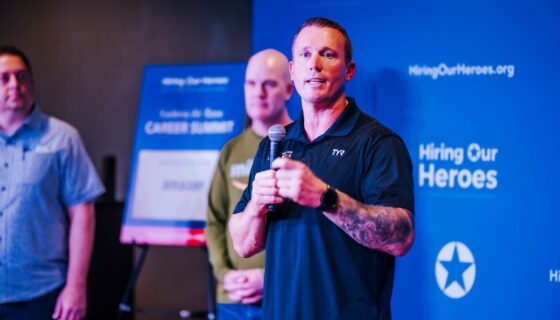How to Make Your Story Stand Out for Hiring Managers

Telling your unique professional story is an opportunity to explain to potential employers how your strengths and the skills you’ve learned, combined with your career interests, make you a stand-out candidate.
“For a hiring manager who looks at dozens of resumes a day, all resumes start to look the same. The story behind the resume is what differentiates one candidate from another,” said Amazon’s Senior Manager for Military Talent Acquisition Beau Higgins.
Having a compelling and professional story may be the difference between hearing “you’re hired” and “thank you for your application.”
Since there is so much riding on your ability to tell your story in a compelling light – how do you develop your professional story?
Here are three tips for telling your professional story in a way that will make hiring managers want to hire you.
Your Story Connects the Dots for Hiring Managers
Abie Chong, a Corporate Recruiting Manager for Hilton’s military programs, said transitioning service members should research the job, career field, and the industry that they want to work in after they leave the military. After completing this research, Chong recommends that they incorporate the civilian terms used in those job descriptions in their stories, resumes, and online profiles, such as their LinkedIn profile summary.
“That’s the language that these recruiters, human resources and hiring managers speak, so it’s really important for service members to learn that new language,” he said. “It’s so important to learn the industry terms that are used on the outside so that they can connect the dots for recruiters and hiring managers.”
Chong offered this example for service members who worked in logistics.
“In logistics, they use a military logistics system. Even though it’s not the same as the ones that civilians use to order and take inventory of supplies and equipment, it’s the same concept. I think being able to relate that concept is very important,” he explained.
Related: Interview Mistakes Veterans Make
Senior Manager for Military Spouse Programs at Hiring Our Heroes, Amanda Crowe, advises military spouses on the value of sharing their stories at our AMPLIFY career intensives.
“A lot of us are very tempted to start with the military affiliation. Don’t start with ‘I’m a mom. I’m a wife.’ All of those (roles) are equally important things, but that’s not what we’re here to talk about in the job interview,” she said. “Keep (your story’s) focus on your professional abilities rather than family-related information.”
Resist the Temptation to Overshare
Your professional story gives context and supportive details to your resume. Your story is not a way to share the personal details of your life.
“Veterans tend to be a little too candid and that can be detrimental,” Chong said.
When asked “tell me about yourself,” focus on the elements of your professional background that are relevant to the job.
“Talk about what you’ve been doing lately and how that’s going to contribute toward the position that you’re applying,” Chong said. “You don’t want to discuss any disabilities that you might have. You don’t want to necessarily talk about your marital status or how many kids you have because those could be biases for employers, even though they shouldn’t be.”

Focus Your Story on Your Grit and Lessons from Your Failures
The military spouse story is a compelling one for hiring managers, Higgins said.
“More and more we’re finding that the people who are successful at Amazon are the people who have that magical thing called grit. As a spouse, you have that in spades,” Higgins said. “Grit proves that you’re going to work through the challenges that come up in the civilian world. You aren’t going to quit. You’ve proven that time and time again as a military spouse.”
As a military spouse or a service member, focus your professional story on your grit.
“That’s the part that doesn’t come across on a resume,” Higgins said.
Getting comfortable with your story as a military spouse can help explain your resume to hiring managers.
“Sometimes, owning up to that military status gives context as to why your resume looks differently than others that hiring managers will see,” Crowe said. “You have to be the confident one and know what your skills are and how to put those forward. And be ready to call out the positives. Even if you have gaps in your resume, I think that there’s a way to own it and still put a positive spin on it.”
Related: Tips for Military Spouses Answering Interview Questions
Be ready to share stories about the times when you succeeded and the times when you failed in the workplace. Don’t say “I’ve never failed.”
“You have to be able to talk about failure and how you learned from failure and grown from it,” Higgins said. “We don’t expect you to be perfect and we don’t need you to be perfect, so talk about the challenges that you’ve faced and overcome.”
Your professional story is your opportunity to show hiring managers and job recruiters the positive impact that your military experience, as a service member, reservist, National Guardsman, Coast Guardsman or military spouse, has had on your career. Take the time to share your story. They are ready to hear it.
“Despite technology tools and all of the things that have been designed to help military service members transition into the civilian world, I still think the elevator pitches and personal conversations at Hiring Our Heroes event are important,” said Brad Bentley, President of FASTPORT. “While at the HOH event in Kaiserlautern, Germany, I met an airman who grew up near my hometown and went to a rival high school. We have been communicating since the hiring fair, and I am certainly motivated to help him make connections.”



